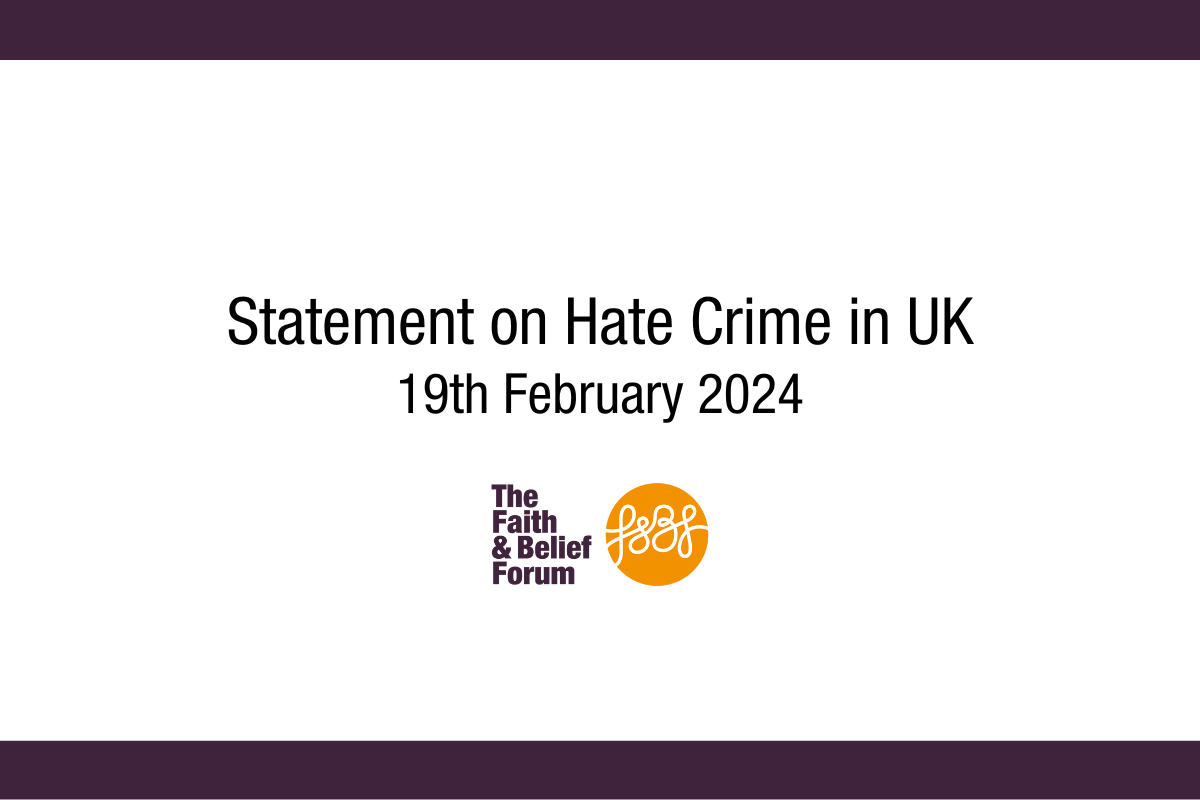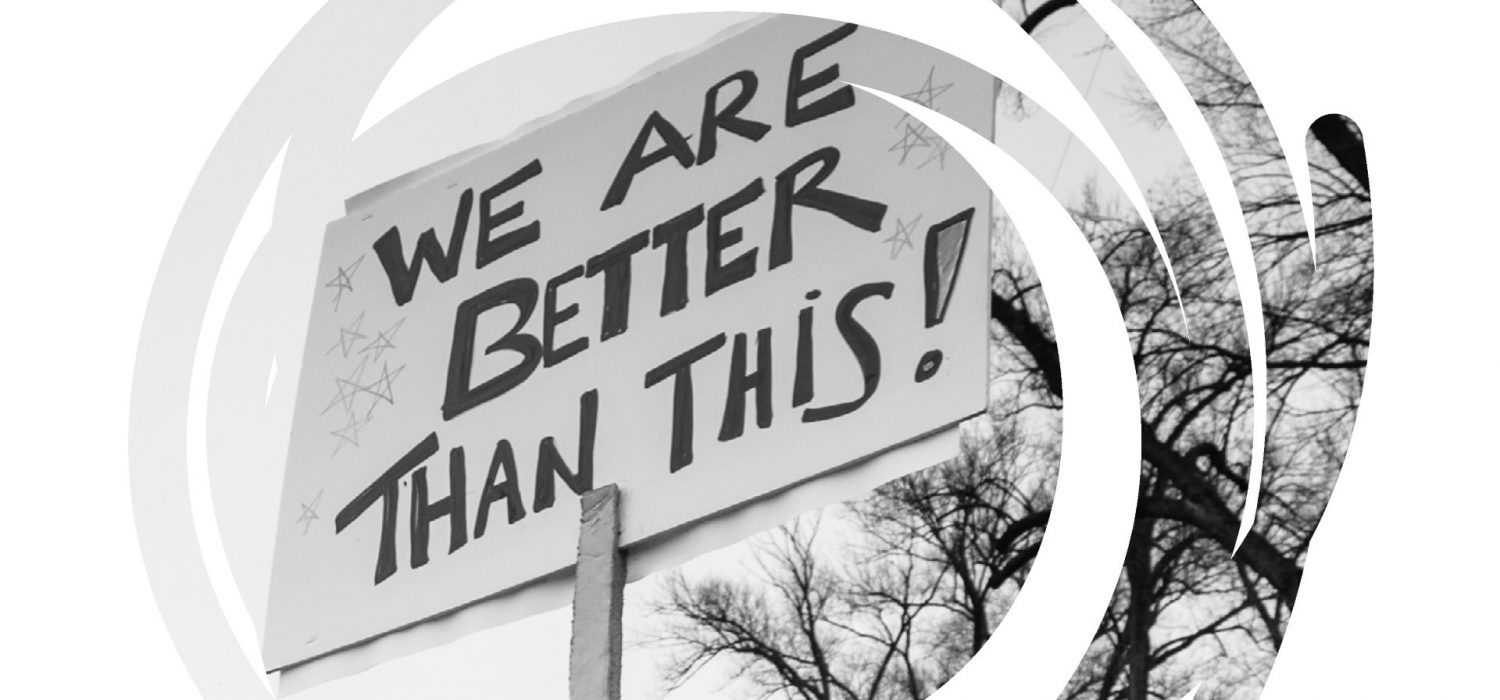
Statement on Hate Crime in UK – 19th February 2024
19 / 02 / 24
Menu

03 / 07 / 19

A new report by the Faith & Belief Forum and the Department of Psychosocial Studies at Birkbeck calls on faith and community organisations to work together to address religious hate crime in their local areas. The report recommends that responses to hate crime should be led by local communities and seek to challenge divisive narratives with messages of belonging.
The report, ‘Hate Crime, Faith and Belonging’, draws on insights from a roundtable event at Birkbeck which brought together 23 local organisations, academics and policy experts to explore the issues and share good practice. It is the second of a series of three reports supported by a grant from Dangoor Education which look at different aspects of belief and belonging in London.
The report highlights that faith and belief groups and minorities in London are increasingly the targets of hate crime, which pose a serious barrier to a sense of belonging. The most common types of religious hate crime in the UK are anti-Jewish (Antisemitic) and anti-Muslim (Islamophobic). The increase of reported hate crimes, and the massive increase in how these incidents are shared and publicised online, have the potential to divide communities into isolated groups who fear and oppose each other.
Hate crimes affect not only those directly targeted, but they also send a message of exclusion to people who belong to the same community as the victim, and to those who witness the crime directly or online. If these hateful messages are not addressed, they can cause a cycle of division and violence in local communities. The report recommends that responses should include 1) prosecuting offenders to show that hate crime is unacceptable, and 2) promoting messages of belonging in response to the crime’s exclusionary messages.
Responses to hate crime should be collaborative, bringing together faith groups, faith forums, community organisations and local government. The report finds that responses which bring together different affected groups have a double benefit: they enable better access to services, and they communicate that one group is not struggling alone. The profile of hate crime is different in each borough and often in each neighbourhood; therefore, effective responses should be sensitive to and led by local communities.
The report authors say: “Because every Londoner is affected by hate crimes to varying degrees, we all have a part to play in responding to hate crime. Our responses to hate crime demonstrate who belongs and what values we share as Londoners. Any positive response to hate crime, however small, promotes the message on the cover of this report – ‘we are better than this’.”
The full report can be downloaded from the Faith & Belief Forum’s website. The aim is that it will serve as a guide for those looking to remove barriers to belonging both in London and the rest of the country.
Download the report: https://faithbeliefforum.org/report
For more information:
Email: philip@faithbeliefforum.org
Phone: 0207 482 9535
Notes for editors
‘Hate Crime, Faith and Belonging’ was written by Jonathan D Smith, Lenita Törning, Ben Gidley and Ruth Sheldon, in a collaboration between the Faith & Belief Forum and the Department of Psychosocial Studies, Birkbeck, University of London. The report draws on insights from a roundtable discussion with the same title. It is one of three such roundtables hosted by the Faith & Belief Forum and the Department of Psychosocial Studies at Birkbeck.
Presenters at the roundtable and respondents who are mentioned in the paper include:
The Faith & Belief Forum has worked for over 20 years to build good relations between people of all faiths and beliefs, and to create a society where difference is celebrated. The organization creates spaces in schools, universities, workplaces and the wider community where people can engage with questions of belief and identity and meet people different from themselves. We were founded in 1997 as the Three Faiths Forum. Over the years our work expanded to include people of all faiths and beliefs, both religious and non-religious. In 2018, we changed our name to the Faith & Belief Forum to better reflect this inclusive ethos. For more information, see https://faithbeliefforum.org
The Department of Psychosocial Studies, Birkbeck, University of London (BDPS) was founded in 2000 and aims to investigate a wide range of contemporary social, political and personal concerns. The Department is unique in its interdisciplinary focus and draws together academics and clinicians from a wide range of disciplinary backgrounds to think together about the relation between social and psychic life. For more information, see http://www.bbk.ac.uk/psychosocial/about-us.
Briefings on Faith, Belief and Belonging are supported by a grant from Dangoor Education (http://dangooreducation.com).